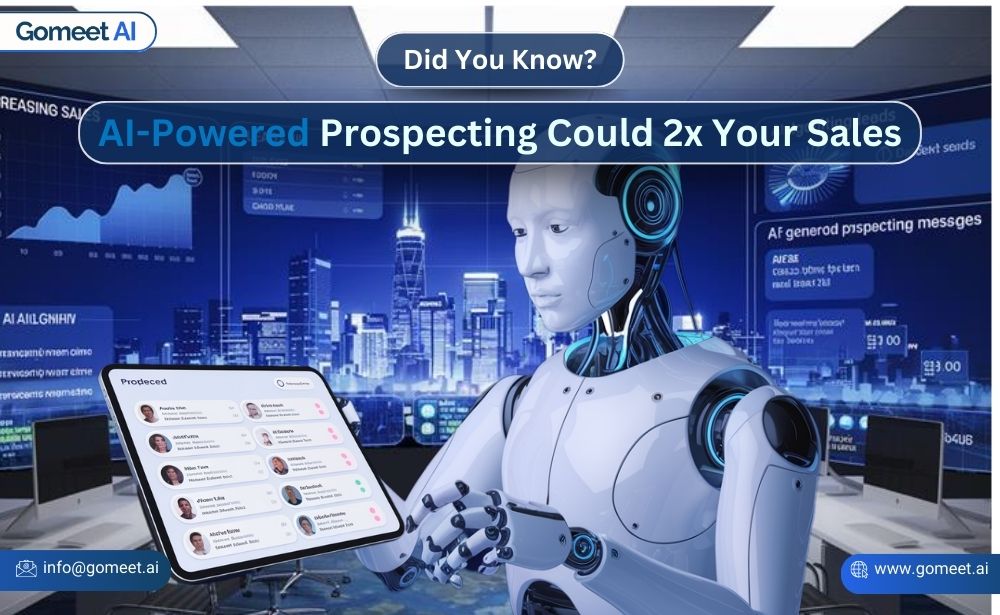Imagine this: you’re a sales rep staring at a list of cold prospects, wondering which ones might actually lead to a sale. Now, imagine an AI tool that can automatically filter that list, predict which leads are most likely to convert, and even send personalized outreach on your behalf. Sounds futuristic? It’s not—it’s happening right now.
Artificial Intelligence (AI) for B2B sales has revolutionized the sales process, specifically in areas like prospecting and lead generation. With AI’s ability to analyze data at scale and automate repetitive tasks, sales teams can now focus on closing deals rather than hunting for leads. One of the key game-changers here is sales lead automation, a process that transforms the way businesses manage their sales pipelines.
In this post, we’ll explore how AI-powered sales tools are reshaping B2B sales, boosting productivity, and driving higher conversion rates. Whether you’re new to the concept of AI in sales or looking to optimize your current strategy, you’re in the right place.
The Shift to AI-Powered B2B Sales
Why AI is Transforming B2B Sales for the Better
B2B sales have long been a manual, time-consuming process. Sales teams spend countless hours identifying leads, qualifying them, and crafting personalized pitches. This is where AI steps in as a game-changer. AI-driven sales tools can sift through vast amounts of data to identify the most promising prospects, predict customer behavior, and even suggest the best time to reach out.
Let’s look at some real-world data to drive this home. According to a study by Salesforce, companies that adopt AI for sales see a 50% increase in lead generation and 67% faster deal closure. That’s because AI-powered tools aren’t just guessing which leads are valuable—they’re making informed decisions based on data patterns, historical interactions, and predictive analytics.
Another report by McKinsey shows that companies using AI for sales have improved their lead conversion rates by 30%. This is particularly important in B2B sales, where the decision-making process is complex and involves multiple stakeholders.
Understanding Sales Lead Automation and Its Benefits
How Sales Lead Automation Enhances Efficiency
So, what exactly is sales lead automation? In simple terms, it’s the use of AI tools to automate repetitive tasks in the sales process—like sorting through prospects, qualifying leads, and sending follow-up emails. This not only saves time but also ensures a more consistent and data-driven approach to lead management.
Here are the key benefits of sales lead automation:
- Time Savings: Sales teams spend less time on administrative tasks and more time engaging with qualified prospects.
- Better Targeting: AI tools can analyze data to target prospects who are more likely to convert, improving the quality of leads.
- Higher Conversion Rates: By automating follow-ups and nurturing leads with personalized messaging, sales teams see higher engagement and conversions.
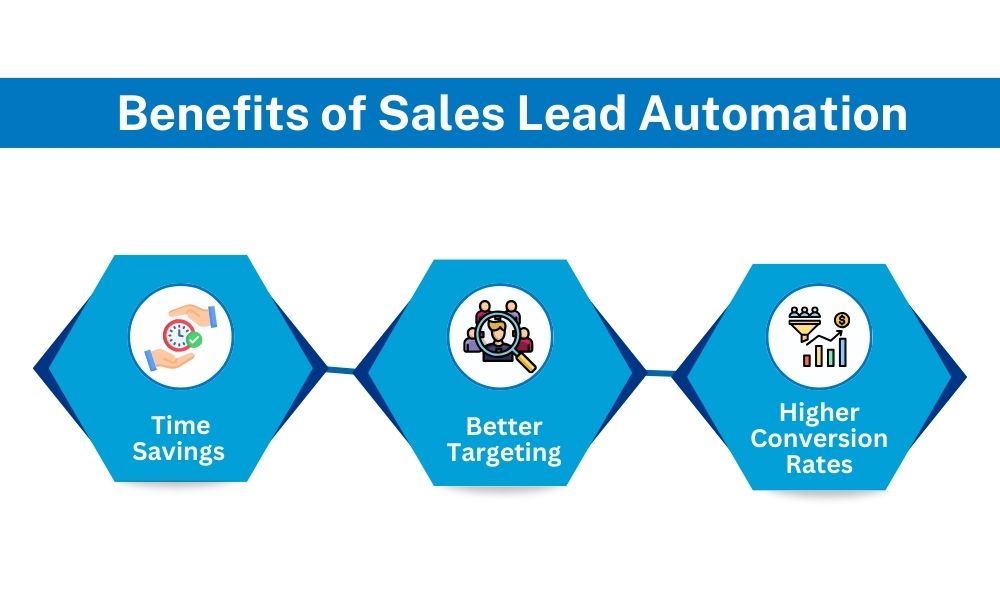
Real-World Example
By implementing AI-powered sales prospecting software, many businesses have reported cutting the time spent on lead qualification by up to 50%, while also seeing a 20% increase in the number of qualified leads. These improvements come from automating the identification and engagement of high-quality prospects, allowing sales teams to focus on closing deals rather than spending time manually searching for leads. This shift to AI-driven automation has led to greater efficiency and tangible results in sales performance.
Core Features of AI Sales Prospecting Software
Key Features of AI-Powered Sales Prospecting Tools
AI-powered sales prospecting software comes with a range of features that make prospecting smarter and more efficient. Here are the top features to look for:
- Predictive Analytics: These tools can predict which prospects are most likely to convert based on historical data and behavioral analysis. This helps sales teams prioritize their outreach.
- Lead Scoring: AI tools automatically score leads based on factors like engagement level, company size, and decision-making power. This allows sales teams to focus on high-potential leads.
- Personalized Messaging: AI tools can craft personalized emails and follow-ups based on the prospect’s behavior, ensuring that outreach is relevant and timely.
- Automated Follow-Ups: Forget manual reminders. AI tools can automatically send follow-up emails, ensuring that no lead is left behind in the sales pipeline.
These features not only make the sales process more efficient but also improve the overall customer experience. AI B2B sales tools allow for personalized, data-driven interactions that resonate with potential buyers, leading to better engagement and, ultimately, higher conversion rates.
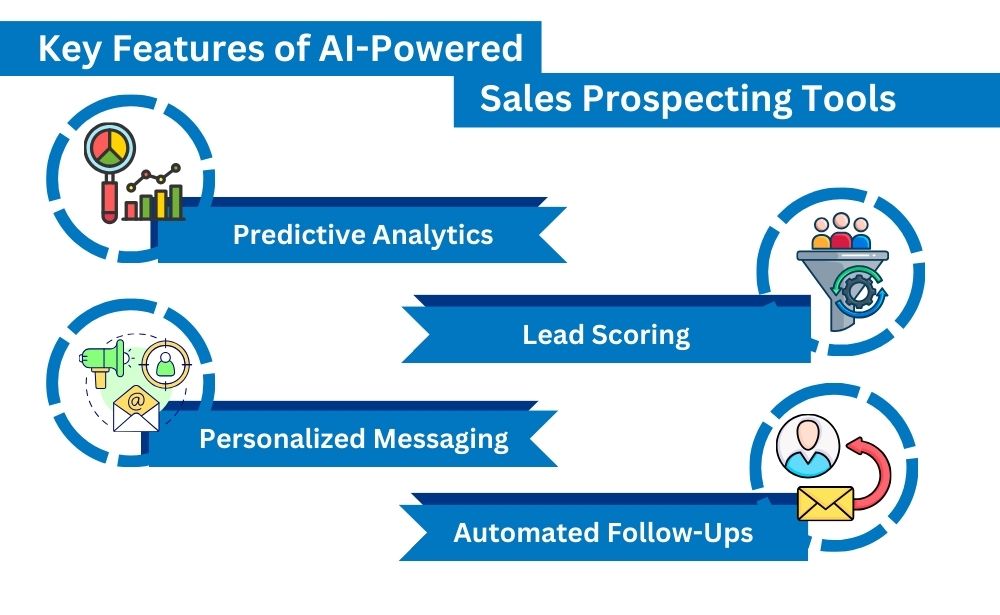
Implementing AI Sales Lead Automation in Your Sales Process
Best Practices for Integrating AI Sales Lead Automation
Integrating AI sales lead automation into your existing sales process doesn’t have to be complicated. Here are a few steps to get started:
- Identify Your Needs: Before adopting AI tools, it’s essential to identify what parts of your sales process can benefit the most from automation. Is it lead qualification? Follow-ups? Or maybe prospecting itself?
- Choose the Right Tool: Not all AI sales tools are created equal. Some are more suited to smaller businesses, while others are designed for large enterprises. Make sure you choose a tool that aligns with your business size and sales strategy.
- Train Your Team: AI tools are only as effective as the people using them. Ensure your sales team is well-trained to make the most of these tools.
- Start Small, Then Scale: Don’t try to automate everything at once. Start by automating one aspect of your sales process—like lead scoring—and gradually scale up as you become more comfortable with the technology.
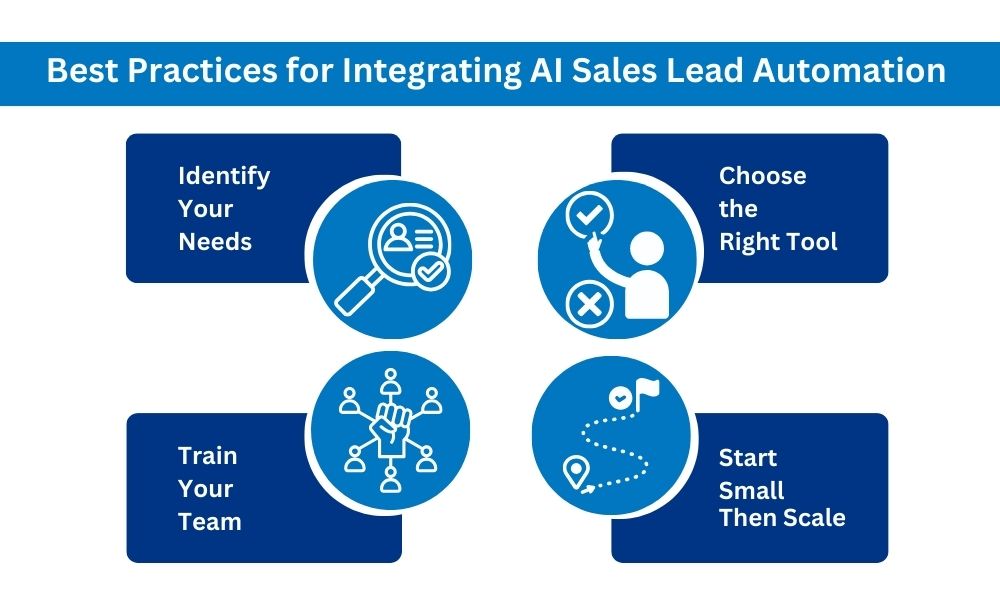
Challenges and Future of AI in B2B Sales Prospecting
Addressing Challenges in AI B2B Sales Prospecting
While AI offers tremendous benefits, there are also challenges to consider. Here are a few:
- Data Privacy: AI tools require large amounts of data to function effectively, and this raises concerns about data privacy and compliance with regulations like GDPR.
- Cost: Implementing AI solutions can be expensive, especially for smaller businesses. However, the long-term benefits often outweigh the initial costs.
- Tech Adaptation: Not all sales teams are tech-savvy, and adopting AI tools can sometimes be met with resistance.
Looking ahead, the future of AI in sales is bright. Advancements in predictive sales analytics and machine learning will continue to refine the prospecting process, making it more accurate and efficient. According to Gartner, by 2025, 80% of B2B sales interactions between suppliers and buyers will occur in digital channels, further highlighting the importance of AI in sales.
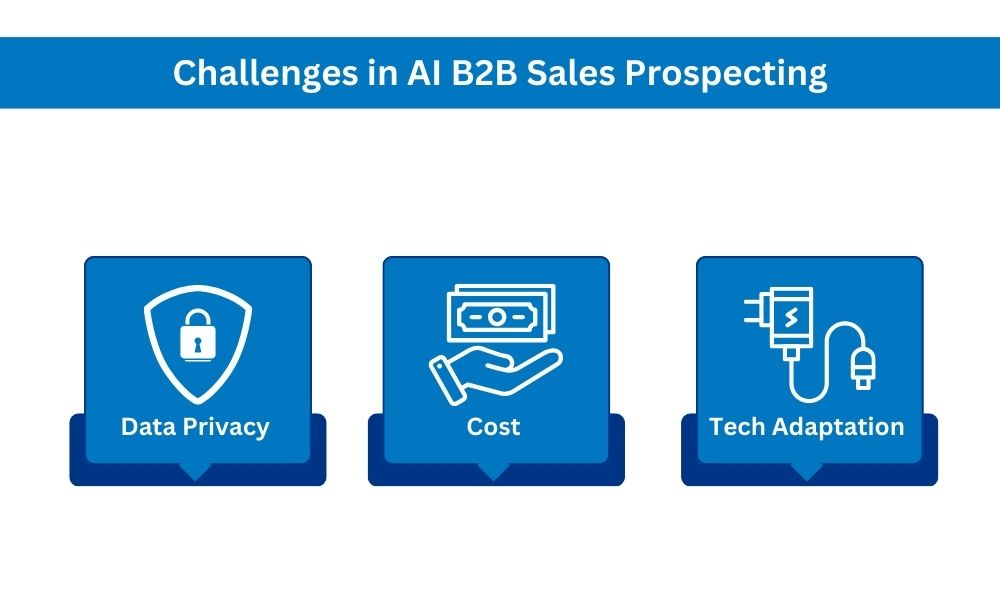
Conclusion
To sum it up, AI for B2B sales is no longer a luxury—it’s a necessity. From sales lead automation to predictive analytics, AI is transforming the way businesses manage their sales pipelines. The benefits are clear: faster lead generation, better targeting, and higher conversion rates. As AI continues to evolve, so will its impact on sales prospecting.

